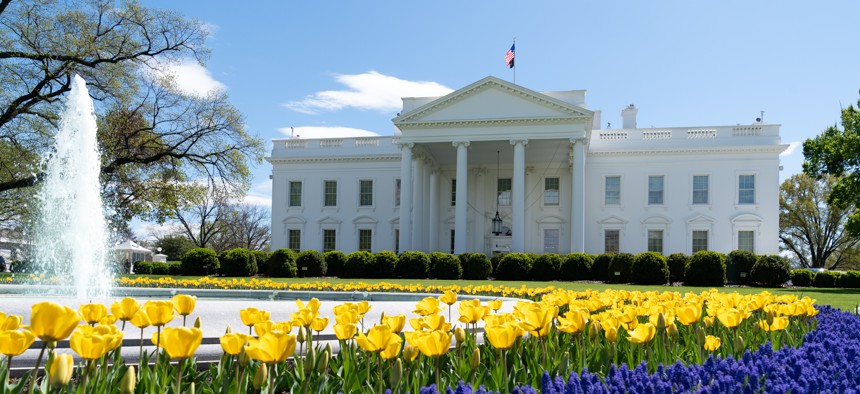
Official White House Photo by Andrea Hanks
White House Advises Agencies on COVID-19 Spending and Reporting
“Time is of the essence,” but “spending transparency and regular reporting will provide important accountability mechanisms to help safeguard taxpayer dollars,” the Office of Management and Budget said in a memo.
On Friday, the Trump administration directed agencies to quickly distribute coronavirus relief funds, while also ensuring transparency and accountability to protect taxpayer dollars.
The Office of Management and Budget published a memo with guidelines for agencies to follow as they ramp up spending through various programs under three recent coronavirus relief bills, including the $2.2 trillion CARES Act. The guidance comes as many experts worry about the lack of accountability and oversight of the administration's coronavirus efforts. President Trump ousted the acting inspector general slated to lead the Pandemic Response Accountability Committee and signaled in a signing statement that he would not enforce some of the oversight provisions of the CARES Act.
The relief packages “provide direct economic relief to the American people, including individuals and small businesses, while providing health care resources to the front line battles where medical professionals are fighting the virus and defending the lives of Americans,” wrote acting OMB Director Russell Vought. “Time is of the essence, and the administration is committed to the rapid delivery of these funds to the COVID-19 relief and response efforts. At the same time, spending transparency and regular reporting will provide important accountability mechanisms to help safeguard taxpayer dollars.”
Some of the directives OMB gave to agencies, which expands on the language of the relief bills, include:
- Work with OMB’s resource management offices to resolve any questions on program design before issuing such funds.
- Work with OMB’s evaluation officers and performance improvement officers to document new program processes, identify risks and project outcomes.
- Report to OMB monthly on obligations or expenditures of “large covered funds,” which exceed $150,000. The CARES Act also requires OMB, the Council of Economic Advisors, Treasury Department, and Small Business Administration to report quarterly on the “effect of COVID-19 relief funds on employment, estimated economic growth.”
- Incorporate performance reporting of coronavirus programs into agency mission plans and reports.
- Make sure qualified agency personnel are overseeing program awards.
- Streamline regulations when feasible to expedite giving out awards.
- Prioritize using evidence-based programs.
- Communicate with state, local and tribal governments and nonprofits on fund use.
- Use “plain language” to describe award programs.
- Ensure data from funding use is reported for public consumption and internal decision-making.
- Consider amending other reporting and audit deadlines over the next 60 days in order to prioritize pandemic-related work.
Additionally, OMB said inspectors general should create plans to use their office funding allocations to uncover any nefarious use of relief monies. “The OIG community and the newly created Pandemic Response Accountability Committee should also work closely with OMB and the agencies to coordinate COVID-19-related oversight efforts, leverage available technology to minimize burden and duplicate efforts, and re-prioritize lower priority audit work to allow agencies and OIGs to better support higher priority COVID-19 work,” wrote Vought.
An appendix in the memo further breaks down sections 15010 and 15011 of the CARES Act, which describe reporting requirements in the most expensive bill in U.S. history. “These sections require federal agencies and recipients to report on the use of covered funds, agencies in coordination with OMB to provide user-friendly means for recipients to meet these requirements, and the [Pandemic Response Accountability Committee] to leverage existing technology and resources to the greatest extent practicable to meet the requirements of these sections,” said the memo. “OMB looks forward to coordinating with the [committee] to efficiently implement these requirements.”
Nick Hart, CEO of the Data Coalition, a trade group that works to make government information more accurate and accessible, said, “federal agencies are much better positioned than they were a decade ago to track and report on emergency spending,” when comparing the coronavirus packages to the 2009 Recovery Act.
“Agencies have so effectively implemented the Digital Accountability and Transparency Act of 2014,” which made federal expenditures more accessible and transparent by establishing data standards for agencies and bolstering the type of data that is posted on government websites and USAspending.gov, according to Hart. “OMB’s guidance outlines processes that build on DATA Act requirements while also aligning with the experience and lessons learned when implementing the Recovery Act during the Obama Administration.”
Overall, he said, “transparency and accountability are always important for our government, but the sense of importance must be heightened for large emergency funding packages because the amount of money rapidly distributed is tremendous.”







